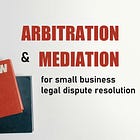Contract Red Flags & Negotiation Tactics (Mini-Series, Part 5 of 5)
Post #60: Don’t get steamrolled—recognize risky clauses and get the terms you need.
Bootstrap Your Business is a Substack community dedicated to supporting new and aspiring business owners with the process of starting, setting up, and operating a small business.
Join me on this Journey with DIY instructional content, commonly used templates and reusable files, and coaching advice! It’s all here!
Go to my Substack Home Page for additional resources for entrepreneurs and solopreneurs: 👇
Did you know…?
According to a study by Huthwaite International, companies:
📌 …with no formal negotiation process had a 63.3% decrease in net income.
📌 …with a somewhat formal negotiation process experienced a 16.2% increase in net income.
📌 …with a formal negotiation process saw a 42.5% increase in net income.
(source)
Welcome to Day 5 of my Contracts 101 mini-series for freelancers, consultants, and small business owners.
If the word “contract” makes you feel overwhelmed — or like it’s something only lawyers and big companies need — you’re in the right place.
This series is designed to remove the fear and formality from contracts.
Contracts are about clarity, protection, and professionalism, and you deserve all three (even if you’re just getting started).
👉 Also, be sure to check out these resources:
Bootstrap Your Business Workflow - a step-by-step guide with the links to all of the top daily posts that walk you through the process from scratch
BYB Book Recommendations - a collection of the best business books to help you on your entrepreneurial journey
BYB Alerts & News - urgent updates for self-employed and business owners - delivered to your inbox - so that you can be more prepared
BYB Documents - a repository of guidance for important business documents with instructions and guides to use them in your self-employment journey
📌 Caveat Emptor
As a business owner, I have had a lot of exposure to business-related contracts, and have learned many lessons along the way (too often by way of hindsight).
However, please keep in mind as you review this newsletter that:
I’m NOT an attorney, arbitrator, or mediator, and I have no formal legal education.
This is NOT meant to serve as legal advice or legal guidance.
I am only sharing my experience — your circumstances and needs may differ.
This newsletter is based entirely upon my experience and research as an entrepreneur.
If you are seeking guidance with any contract-related or legal decision, I encourage you to talk with a legal expert, or contact an arbitration and/or mediation service provider in your area for guidance with your unique situation.
Before You Sign Anything, Pause.
Even when a contract looks “standard,” never assume it’s set in stone.
If you’re running a business — especially as a freelancer or small agency — you must know how to evaluate the contracts that land in your inbox.
Some will be reasonable.
Some will be a dumpster fire.
You need to learn to spot red flags, push back with confidence, and get the language you need to protect your business.
Also in this newsletter, discover my favorite assertive one-liners for negotiating like a pro without sounding confrontational.

🚩 Red Flag Language to Watch Out For
If it looks slippery, lopsided, or unclear, it probably is.
Here’s what to look for:
1. Vague Scope of Work
Terms like “as needed,” “at Company’s discretion,” or “ongoing support” with no limits are a trap.
If the scope is unclear, so is your workload and compensation.
2. One-Sided Indemnity
If you're liable for damages but they’re not, that's unacceptable.
Mutual indemnification is the norm, not a special request.
3. Missing Payment Terms
No payment schedule? No clear due dates? No late fee policy?
That’s a hard pass.
Never assume “we pay net 30” means anything unless it’s in writing.
4. “In Perpetuity” or “Irrevocable” Rights
This is especially common in licensing or IP clauses.
Watch for sneaky attempts to own or use your work forever, even after the contract ends.
5. Unilateral Termination Rights
If they can cancel any time without penalty, but you’re locked in, you’re not in a partnership — you’re a liability buffer.
6. Unclear or Shifting Deliverables
If the deliverables can be changed at will by the client, you’ll never win.
Your time, resources, and sanity are on the line.
7. Excessive Confidentiality or Non-Compete Clauses
These are especially bad when they are overly broad or limit your ability to work with others in your industry.
These terms should be narrowly scoped and time-limited.
8. Unlimited Liability
Any clause that makes you financially responsible for any and all damages, without a cap, is dangerous.
No small business can afford that kind of exposure.
9. Waiver of Legal Rights
Watch out for “you waive your right to…” language.
That includes suing, seeking damages, or even publicly discussing a dispute.
10. Unbalanced Dispute Resolution
If they pick the venue, control the arbitration firm, and you’re stuck with the bill, it’s not a fair setup.
Bonus Red Flag: Confusing Legalese
Contracts full of unnecessary legalese or confusing structure.
Often, this is used to hide unfavorable terms or intimidate you into signing without review.
Push Back Without Burning Bridges
Negotiating terms isn’t rude, it’s smart business.
And in most cases, it’s expected.
Be direct and confident, not tentative or apologetic.
When you ask for changes, explain why those changes matter.
This shows you’re thinking about the success of the project — not just protecting yourself.
For example:
“Let’s revise this to include mutual indemnification so both parties are protected.”
“We’ll need to add an arbitration clause to reduce legal costs if a dispute arises. This protects both of us from attorney fees over minor disagreements.”
“This clause is important for ensuring predictable cash flow—let’s define a 30-day payment window with a 5% late fee after that.”
“This language places full liability on me regardless of fault—I’d like to revise it for shared responsibility.”
Negotiation isn’t a conflict.
Rather, it’s a collaboration to ensure mutual understanding and protection.
What’s Usually Negotiable (and What’s Not)
Push where it counts. Walk away when it doesn’t.
✔️ Commonly Negotiable Terms:
These are the areas where the other party is usually flexible.
Payment schedule and due dates
Scope of work and deliverables
Termination rights for both parties
Ownership and usage rights for IP
Deadlines and timelines
Expense reimbursements
Arbitration or mediation clauses
Publicity and confidentiality terms
Late fees or penalty terms
Subcontracting or outsourcing restrictions
Remember to clearly explain your reasoning when you negotiate, or it may come across as being “difficult” or arrogant.
❌ Commonly Non-Negotiable Terms:
These are the areas where the other party is usually less flexible or entirely inflexible.
Jurisdiction or governing law (especially with large companies)
Standard NDAs or master agreements
Payment platforms or methods (e.g., invoice through a specific system)
Corporate insurance requirements
Mandatory onboarding or background checks
Project management tools or platforms used by the client
Liability caps (often pre-set by legal teams)
If a non-negotiable term clashes with your business model, don’t force it.
You can always walk away.
Ask for Clarification (Without Sounding Dumb)
When you need clarification, don’t say “I don’t understand this part.”
Instead, make it about ensuring clarity for both sides.
Try phrases like:
“To avoid confusion later, can we clarify how this applies if the project is paused?”
“I’d like to tighten this wording to ensure it reflects mutual intent.”
“This section could be interpreted a few ways—let’s pin down what exactly it means in practice.”
“For compliance reasons, I need to confirm exactly what’s expected under this clause.”
You’re not asking because you’re lost.
You’re asking because you’re thorough.
Confident Negotiation Messaging
Skip the fluffy language.
Communicate your needs clearly.
For example:
“This language needs to reflect mutual accountability.”
“I don’t sign contracts with one-sided indemnity clauses—let’s balance it out.”
“We’ll need to make the payment timeline explicit before I can commit.”
“This section needs to be revised to match the agreed scope of work.”
“To move forward, I’ll need this clause updated—happy to send over a clean revision.”
Confidence is not confrontation. It’s clarity.
You Can Always Walk Away
Let me say it plainly:
You don’t have to sign a contract just because someone sent it to you.
You CAN walk away if:
The terms don’t work for you,
You feel like your needs are being ignored,
Your gut says this doesn’t feel right, or
You just feel like it.
There is no contract, client, or opportunity that’s worth putting your business, your reputation, or your mental health at risk.
A failed deal is better than a lawsuit any day of the week — and twice on Sundays.
"Sometimes walking away has nothing to do with weakness, and everything to do with strength. We walk away not because we want others to realize our worth and value, but because we finally realize our own." — Robert Tew
I hope you enjoyed this 5-part mini-series on Contracts!
If you found value in these newsletters, I’d love to get your feedback on:
what you learned,
if there are topics you want to learn more about, or
how you might be able to apply these guidelines to your small business operations.
Share your experience in the Chat!
If you are looking for help with this topic, and you’re not sure where to start,
feel free to reach out to me directly.
Paid Subscribers are eligible for a FREE 30-minute consultation.
I still have a couple of Coaching slots open!
If you enjoyed reading this newsletter, and aren’t ready to become a subscriber, you can leave a tip. :-)
Share your thoughts in the comments if you found something useful or want to add more color to the topic.







